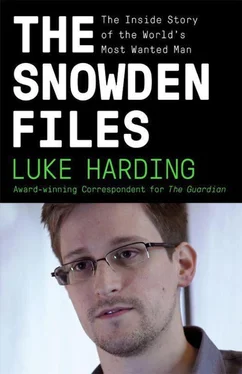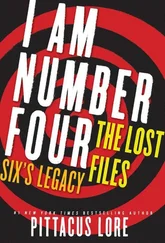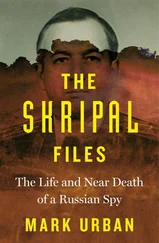Snowden generally wore just a casual T-shirt in his room, but on Thursday 6 June, Greenwald organised a switch. Snowden put on a grey, ironed shirt. He moved from his regular perch on the hotel bed to a chair: behind him a mirror was positioned. It made the room seem less tiny and cramped.
Snowden was about to record his first public interview. It would be the moment when he would introduce himself to the world and would confess – or, rather, proudly own up – to being the source behind the NSA leaks. He told Greenwald: ‘I have no intention of hiding who I am, because I know I have done nothing wrong.’
It was a bold and counterintuitive move, and one that Snowden had contemplated for a long time. His reasons impressed his journalist partners as sound. First, he told MacAskill, he had seen close up the disastrous impact on colleagues of leak inquiries pursuing anonymous sources. He had witnessed the ‘terrible consequences for people under suspicion’. He said he didn’t want to put his colleagues through such an ordeal.
Second, he was aware of the NSA’s ferocious technical capacities; it was only a matter of time before they tracked him down. His plan all along had been that after the first few stories, he would make himself known. This didn’t mean, however, that Snowden wished to emulate Chelsea Manning, whose arrest in 2010 and harsh jail treatment he had followed closely. Snowden said: ‘Manning was a classic whistleblower. He was inspired by the public good.’ As a result, Manning was due to face a court martial in Fort Meade, next door to the NSA’s headquarters – one that was shortly to sentence the young soldier to 35 years in prison.
Snowden intimated that Manning had proved the point that it was impossible for a whistleblower to get a fair trial in the US. A long spell in jail would also stymie the public debate Snowden wanted.
Poitras had been filming Snowden from the first encounter; her camera had had a freezing effect on their early interactions, but now Snowden agreed to talk directly into her lens. He was, as he put it, a ‘virgin source’. Snowden had previously shunned all contact with reporters and the media. He had even avoided showing his face in his girlfriend’s blog. But he was also acutely aware of how much was at stake. What was ultimately important, Snowden accepted, was the public’s verdict. In this context, an interview would help shape perceptions.
Greenwald sat opposite Snowden. He asked the questions. As a lawyer and experienced broadcaster, Greenwald was comfortable with televised interviews. But Snowden’s own on-screen manner would be an unknown quantity.
Snowden, however, gave a remarkable performance for a media newbie, with fluent answers and a cogent account of what had motivated him to take such a radical step. Most importantly, he appeared eminently sane.
Asked why he had decided to become a whistleblower, Snowden said he had struggled inside the system, before finally concluding he had no alternative but to go outside it: ‘When you’re in positions of privileged access like a systems administrator for these sort of intelligence community agencies, you’re exposed to a lot more information on a broader scale than the average employee.’
What he seen had ‘disturbed’ him deeply. ‘Even if you’re not doing anything wrong you’re being watched and recorded,’ he told the Guardian . ‘The storage capability of these systems increases every year consistently by orders of magnitude to where it’s getting to the point… you don’t have to have done anything wrong. You simply have to eventually fall under suspicion from somebody, even by a wrong call. And then they can use this system to go back in time and scrutinise every decision you’ve ever made, every friend you’ve ever discussed something with. And attack you on that basis to sort of derive suspicion from an innocent life and paint anyone in the context of a wrongdoer.’
He added, by way of explaining his own decision to blow the whistle, with all the foreseeable consequences for the rest of his life: ‘You realise that that’s the world you helped create and it’s gonna get worse with the next generation and the next generation who extend the capabilities of this sort of architecture of oppression.’
MacAskill, who watched, gripped, as Poitras filmed, felt Snowden came across even better on camera than in person.
For the three journalists, those Hong Kong nights and days blurred into one another: a succession of gruelling work periods, fuelled by excitement, adrenaline and paranoia.
At the Mira, Poitras was soon able to show her video edit to the other two. She had turned Snowden’s interview into a 17-minute film, beautifully framed and with a set-up shot at the beginning showing Hong Kong harbour and a velvety sky. Its title said simply: ‘PRISM Whistleblower’. They discussed possible cuts, with Poitras eventually crunching the interview down to 12-and-a-half minutes, and releasing a second interview later.
‘I felt as if he had been thrust into the middle of a spy movie,’ MacAskill says. How on earth were they safely to ship the key material over to New York and London?
Talking to the Guardian ’s editor via encrypted chat, MacAskill said the group needed technical help. David Blishen, the Guardian ’s systems editor, was a man who had skills that few working journalists possessed. He also understood how the editorial process functioned. During the WikiLeaks investigation, Blishen helped co-ordinate the redaction of names of sources who had talked to US diplomats and might be at risk if exposed in countries such as Afghanistan, Iraq or Belarus. (This was an important but ultimately futile exercise; in the summer of 2011, six months after the first stories appeared based on US diplomatic cables, Julian Assange released the entire un-redacted cache of documents.)
Blishen was summoned, headed for the airport, and arrived in Hong Kong the next day. For him, too, the trip was nostalgic. He was born in the then colony in 1972; his father, a British official, had been stationed there. When MacAskill joined him at breakfast the two talked about Scottish newspapers where they had both worked. ‘I was none the wiser why I was really there,’ Blishen says. ‘Ewen gave nothing away.’ Afterwards, MacAskill told Blishen to leave his mobile at the hotel reception, and proposed a walk. Once they were outside, MacAskill gave him a memory card; a small, flat, square chip. The SD card didn’t look much. Though it was pretty large – 32 gigabytes.
Blishen needed to transmit Snowden’s video back to Guardian US in New York. Blishen watched the video first, and he was impressed: ‘He [Snowden] is articulate. He seemed principled. With Assange and Manning, people can question if they are rational. Ed seemed completely normal and plausible.’ Taking the edited version, he anxiously jumped into a taxi to get back to his own hotel in Central.
The cabbie asked Blishen in sing-song English: ‘Do you want to go and see girls? They cheap. Very pretty. Do you like Asian girls?’
Blishen needed to get to his room fast. He made clear his lack of interest. The cabbie thought for a moment. His face brightened: ‘Oh, you like boys! Boys! Like me?’ Blishen replied wearily: ‘I’m very boring. I just want to go to my hotel.’ The cabbie persisted: ‘What do you want to do at your hotel?’ Even though it was only 7.30pm, Blishen told the driver he wanted to sleep. ‘I was his worst, dullest passenger ever.’
Back at the Lan Kwai Fong Hotel, Blishen crypto-messaged the Guardian ’s James Ball, in New York. He uploaded the video file via a secure connection in an encrypted folder. He sent over the password separately. Disaster ensued. The Guardian US team proved unable to open the file. Time was running out. In the end, the video file had to go again unencrypted, and potentially hackable by the NSA, though still via secure connection. To everyone’s relief, it arrived unmolested.
Читать дальше












